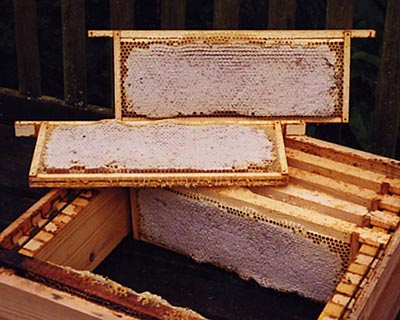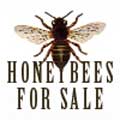Norfolk Honey - questions and answers

Questions and answers
I get asked quite a few questions on beekeeping throughout the year and when I can answer them I do. I have now decided to publish some of them to this Q&A page as they occur.
Q. Please explain 'nuc'.
A. A 'nuc' consists of several frames of bees and brood taken out of a hive. A nuc must contain the queen bee. Nucs are removed from hives for several reasons the most frequent being to establish a new hive in a new location. Nucs often travel in boxes made for the purpose known as traveling boxes.
Q. I am thinking of having a hive in the corner of my garden, will I have to fence it off to keep my small dog away from it?
A. That depends on your dog. Only you can answer that question - although I will say I have watched Alsations sit next to a hive and snap every fith or sixth bee out of the air. Just a snack I guess.
Q. Does it matter if the frames within the nucleus don't match the
frames in the brood box they are to be inhabiting? For example, if the brood
box has
Hoffman frames (which I have been informed by many is the best choice for the
brood box) are the frames to be transferred from the nucleus supposed to be
the same, or if they are different can the bees be transferred from the nucleus
frames onto the Hoffman frames within the brood box - or even the other way
around? Or, if the frames are different, is it best just to transfer the frames
from the nucleus into the hive and changeover at some later date (quite how
this is done I don't at this time know!)?
A. If the bees in nuc box are on frames of a different type to those in
the brood box you put the frames with the bees into the brood box and
gradually sort out the frames later by slowly moving to the outside of
the box the frames you want to remove. The bees use the frames on the
extreme outside of the box the least. You can remove a couple of
frames and introduce new frames easily in May, June and July. If you are mixing frames it is a good idea to have some plastic spacers to hand.
Q. I am interested in keeping some bees but have never done
so before. I live in the country and have a field of approx 5 acres and the
surrounding area is all rural including the river severn close by so I think
it would be a good environment for the bees, would you agree? What would
I need to get started? how much would it cost? and where would I get the
equipment / bees from? how many bees / hives can you keep in one given area?
A. Sounds like a great environment especially as you are
in control of a good portion of it and can therefore grow suitable trees
and plants for pollen and nectar production. The river will be good too.
The farmland will probably be good some years and not so good others depending
on what crops are being grown in it.
An ideal start would be three hives sited an area ten/twelve feet square. I
put mine on paving slabs with buildings blocks on top see http://www.norfolkhoney.co.uk/examples/index.php There
are other methods and hive stands available including those made from welded
angle iron.
The cost of a hive with bees changes by the year but my offer for beginners
this year is here http://www.norfolkhoney.co.uk/equipment/complete_kit.php Basically
you need to allow for an all in expenditure of around £500 for each hive
to get started. Plus around £100 to £150 for a suit, smoker, hive
tool, bee brush etc. etc. I believe a hive full of bees in mid season with supers
on is valued at £600 by the BBKA
I would always advise buying your bees locally if you can as it is less stress
on the bees and joining your local beekeeping association would be a good start
towards that. (You can get more details from the national BBKA).
However, things have been bad in the last few years and at the moment I would
advise buying bees from wherever you can as soon as you can and to then start
breeding your own ASAP. For more on queen rearing click
here
In an area of five acres you could have a lot of bee hives and once you get
the hang of keeping and breeding them you could produce a considerable amount
of honey and bees for sale - if that is what you want to do.
Q. After some research in to CCD and seeing how bee keeping is done
I am in serious consideration of becoming a bee keeper, I feel that I would
be ideal as I live
on a large farm surrounded by acres of agricultural land, although we grow
mainly wheat and sugar beet we do have a lot of hedges that grow blackberry's
and some of the surrounding land grows rape seed.
I do not know any thing about how I would keep the bees and would like to know
what steps I could take.
Do I need to maintain them every day, could I go away for a few weeks
and not have to maintain them?
A. For 5 or 6 months of the year (winter) bees need no attention
from you at all save maybe a little food for Christmas (no more than half an
hour for each hive).
Then in early spring they need a little more attention -- they need to be given
some medication to kill the Varroa mite (no more than half an hour for each
hive).
Once the season is underway -- mid April to end July -- the most you will need
to do is spend one hour per week inspecting each hive. You can take honey off
at time there is some between May and October but many bee keepers take off
honey in late July early August. They then feed and treat in August so during
the months August to November you need to feed them and check them occasionally
-- one hour
every few weeks.
The ideal number of hives to start an apiary with is three.
To buy the complete hive ready to use with three supers made up and with
a starter nuc of bees in residence cost around £500 - £700 new depending
on the quality of the hive (you will also need a veil and smoker etc). Beekeeping
as a hoby is much cheaper than sailing or golf!
Each hive should make from 30 to100lb of honey each year. The BBKA (http://www.britishbee.org.uk/)
recommends selling honey at £4 per 1lb jar (2008 prices).
Bees on oil seed rape can make a lot of honey early in the year if the weather
is good. To make rape honey your bees will need to be in good condition and
strong and ready for the rape once it comes into bloom. To rely on the
hedgerows - blackberries, wild flowers etc. for your honey production
(unless there is really good weather and plenty of hawthorn in bloom earlier
in the year) is not so good as far as quantity goes but the quality some
would say is better than honey made from rape.
You can generally borrow an extractor by joining your local beekeeping association.
You
will also be able to ask your local association about bee keeping courses
in your region. Visit http://www.britishbee.org.uk
to get details on your local association
Q What do you mean by 'split'
A Literally to split your colony into two portions for swarm
control or queen rearing
Q I am very new to the field
of beekeeping, so I apologise if this question seems at all stupid. I live in
what can only be described as a new development of houses, so my neighbours are
fairly close. Given my geographical position is it possible or sensible to keep
bees in this kind of location.
A Yes you can keep bees in your location given that they
are the right strain of bee. You need bees that don't make too much fuss when
opened up and that settle down again quickly when you have finished inspecting
them and bees that don't 'follow' you back down the garden path trying to sting
you.
You can induce the bees to fly high by putting a fence or trellis of plants
in front of the hive about four feet from the entrance. The top needs to be
above head height so that the bees fly out of the entrance of the hive and
up and away. The entrance to the hive can face in any direction but south to
south west is recommended.
It is also wise to let your neigbours know when you intend to take honey off your bees and give them some to keep them sweet.
Q Are there any groups you would advise talking too in my
locality when considering taking up beekeeping?
A I would advise joining your local bee keeping association.The National Association
http://www.britishbee.org.uk/ should
be able to give you contact information for your local group.
Q I use dried wood pulp in my smoker as I have plenty of trees and rotten wood. Do you know if willow and its fumes are ok to use in a smoker and what do you find best? I have been using a standard smoker which does not last very long, maybe I should get a bigger one.
A Re dried wood in smokers.
I use very old, dead, dried wood to get my smoker going - but then top it up with other material. I use wood shavings, cardboard, dried grass, dead bracken and anything that will burn oh and old sacking too. Actually old sacking works well for starting the smoker off as well as old dried wood. When I come to use the smoker I tip everything from the last session out into a bag. Then I start it with some old wood or sacking at the bottom of the smoker and put cardboard in then some of the old material from my bag mixed with wood shavings and finally top up with more cardboard.
My current supply of old wood happens to be oak and the shavings are poplar - before that I would use any old dried wood I could find. But to answer your question about willow - to be honest I don't know specifically how that burns as compared to others. You probably know more than me about that one. And yes the bigger the smoker the longer it will last.

